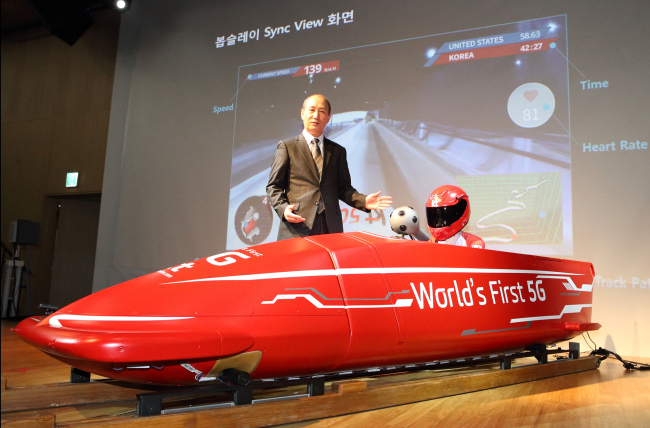South Korean telecommunications company KT on Tuesday unveiled its latest preparations for the successful deployment of a pilot 5G network service at the 2018 PyeongChang Winter Olympics.
Short for fifth-generation, 5G is an ultra-fast wireless network system offering up to 20 times faster transmission speeds than the existing 4G or Long-Term Evolution networks. The futuristic network is expected to be fully commercialized around the world in 2020.
KT has pledged to run the world’s first-ever 5G pilot service at the Olympics in 2018, two years before competitors. In doing so, the firm is hoping to make the 5G specifications used for PyeongChang the global standard for future 5G networks worldwide.
 |
Oh Sung-mok, vice president of KT’s network division, introduces new services running on 5G networks during a press conference in Seoul, Tuesday. (KT) |
Last month, KT publicized its 5G specification guidelines on its website. The guide was made in partnership with global equipment makers and chipmakers including Samsung, Nokia, Ericsson, Intel and Qualcomm, in the hopes of inviting small firms to join the 5G network equipment business.
“These open specifications will spur the development of various 5G-related systems, repeaters and devices,” said Oh Sung-mok, vice president of KT’s network division.
Oh also pledged to ensure that KT’s 5G specifications are adopted into the international 5G standards to be set by the global telecommunications standardization body 3GPP.
During the event Tuesday, KT showcased its projects aimed at improving and stabilizing its new 5G network technology, while offering a glimpse of the potential applications that the ultra-fast network will have at the upcoming Olympics.
For instance, KT has built up a 5G field test network around Gwanghwamun Square in central Seoul, a crowded area with a large floating population and several tall buildings that can interfere with network signals.
“We have been steadily improving our network capabilities to arrive at a speed of 2.5 gigabytes per second at both indoor and urban locations as of now,” Oh said. “We will raise this figure to reach 5 gigabytes per second at PyeongChang.”
The Korean telecom carrier also showcased a 5G Bus equipped with 5G equipment. Even when the bus is moving, those inside the vehicle can enjoy uninterrupted 5G services through smooth signal handovers between different base stations.
In addition, KT introduced a 5G-based “sync view” camera that would provide a more immersive view of the bobsled races at the Olympics.
“Given that bobsleds travel at very fast speeds of up to 153 kilometers per hour, it is often difficult to connect them to a wireless network. However, we have developed a new network frame suitable for fast speed environments,” Oh said.
KT is in “positive talks” with the International Bobsleigh & Skeleton Federation as well as the International Olympic Committee to apply its technologies during the Olympics.
The Korean telecom carrier plans to finish setting up its 5G network infrastructure at sporting event sites in and around PyeongChang and parts of Seoul by September 2017. KT’s 5G pilot network is scheduled for activation in February 2018.
As a forerunner in 5G development, KT hopes to help Korean companies take 20 percent of the global 5G market, which is expected to grow to $1.86 trillion in 2026, as announced by the Ministry of Science, Future Planning and ICT in 2014.
By Sohn Ji-young (
jys@heraldcorp.com)








